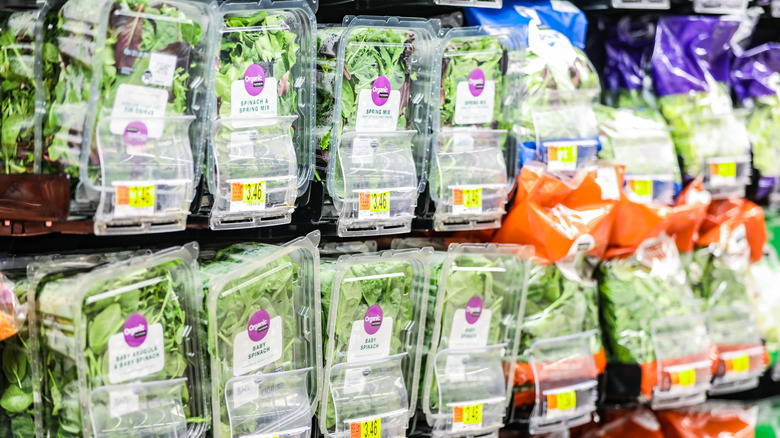Michigan's Salad Kit Recall: The Affected States And Shops To Know
Lettuce producer Revolution Farms has issued a voluntary recall through the U.S. Food and Drug Administration (FDA) due to a possible listeria contamination in some products. No illnesses had been linked to this product as of the April 5 recall announcement. The listeria monocytogenes that cause listeria infections were detected by a random sample test conducted by the Michigan Department of Agriculture and Rural Development.
The recalled products were distributed to SpartanNash stores, Meijer stores, Bridge St. Market, Kingma's Market, Fresh Thyme Market Grand Rapids, Fresh Thyme Market Kalamazoo, Horrocks Market Grand Rapids, Doorganics, Cherry Capital Foods, Gordon Food Service, Van Eerden Foodservice, Vine Line Produce, Luna restaurant, Russ' Commissary, and Pearson Foods Corporation located in Michigan, Ohio, Indiana, Illinois, Kentucky, and Wisconsin. All of the linked products were sold under the Revolution Farms brand name and were packaged between March 3 and 11.
Affected retailers have removed all of the possibly contaminated products from their shelves. Customers who may have purchased some of the recalled lettuce should discard them immediately or return them to the retailer for a full refund.
Possibly contaminated products
Fifteen Revolution Farms products were recalled due to the possible listeria contamination. This includes those sold in bags as well as plastic tray containers, and includes lettuce mixes as well as salad kits. The full listing of contaminated products, along with the affected sell-by dates and UPC codes, has been published by the FDA.
According to the Mayo Clinic, healthy persons rarely become seriously sick due to listeria infections. However, it does pose a serious health risk to children, the elderly, pregnant persons, and the immuno-compromised. Early symptoms include fever, nausea, diarrhea, muscle aches, and chills, but may develop into more serious symptoms such as loss of balance or convulsions if it spreads to the nervous system. Refrigerating or freezing possibly affected products is not sufficient to kill the bacteria and may still spread the pathogens that cause listeria.
Illinois Institute of Technology's Institute for Food Safety vice president and director Bob Brackett told Mic that rewashing lettuces contaminated with these pathogens will not affect them. Possibly contaminated products should be disposed of immediately or returned to the point of purchase.

